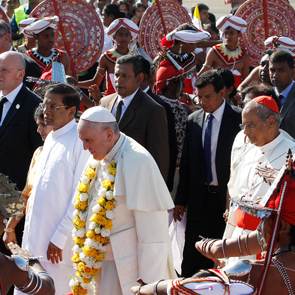On 12 January Pope Francis will begin a three-day visit to Sri Lanka instigated by the Catholic Church, who invited him to canonise a seventeenth-century priest and missionary, Blessed Fr Joseph Vaz, as the country’s first saint.
The visit comes at a key moment for Sri Lanka. Last week’s presidential election delivered a shock result with long-time leader Mahinda Rajapaksa unseated by his erstwhile ally, Maithripala Sirisena.
Sri Lanka remains a bitterly divided country. At this crucial time, can we and should we expect the papal visit to make a difference?
Five years after the end of the civil war, the minority Tamil population remain politically and economically marginalised by the Sinhala majority, of which both Rajapaksa and Sirisena are members. The country is some way off national reconciliation and healing, as highlighted in the pastoral letter issued by the Sri Lankan Bishops’ Conference in December 2013.
 The bishops’ letter presents a roadmap for reconciliation and voices concern for a lack of accountability for disappearances and other human rights violations and, crucially, for ongoing failings in due process, including the use of torture for detainees accused of terrorism.
The bishops’ letter presents a roadmap for reconciliation and voices concern for a lack of accountability for disappearances and other human rights violations and, crucially, for ongoing failings in due process, including the use of torture for detainees accused of terrorism.
At Freedom from Torture, a UK charity dedicated to treating torture victims seeking refuge here, we receive more referrals for Sri Lankans than from any other country. In 2013 some 299 Sri Lankans were referred for psychological therapies or to have their injuries forensically documented.
In accordance with international protocols our doctors have documented 160 cases of torture by Sri Lanka’s state security services since the end of the civil war in 2009, including a number of cases as recent as 2012 and 2013.
The evidence demonstrates that torture is still routinely practised by the Rajapaksa regime, mostly on ethnic Tamils accused of links with the now outlawed Liberation Tigers of Tamil Eelam.
This torture typically includes rape and sexual violence, prolonged use of solitary confinement, beating, asphyxiation and stress positioning. Such blatant ill-treatment strongly suggests that the members of the security forces perpetrating this torture have no fear of being punished for their actions.
The Sri Lankan government commissions set up to establish accountability for atrocities committed in the closing stages of the civil war (atrocities were committed by all parties, with the civilian population paying the price) have proved ineffective. Bishop Joseph Rayappu of Mannar, in north-western Sri Lanka, recently condemned them as “whitewash”.
So what impetus can Pope Francis’ visit deliver for national healing? Catholics, who are 8 per cent of the nation, are counted among the Tamil and Sinhalese communities. The Pope comes from Argentina, a country that has experienced human rights abuses and continues to seek reconciliation through investigations, prosecutions and redress for the victims. He will be aware that for healing to begin, justice must be done and impunity for ongoing human rights violations – such as the torture we continue to document – must end.
Francis will back his bishops’ calls for internal action in Sri Lanka on human rights violations. However in their letter, the bishops stop short of calling directly for government co-operation with the UN investigation, the report of which is due in March. The UN investigators were denied entry to Sri Lanka and have had to proceed without the co-operation of the Government. But given that the internal processes have failed, it is crucial for building trust that the Sri Lankan authorities lend their support to the independent investigations.
The bishops set out a worthy roadmap. Pope Francis, one of the most respected spiritual leaders in the world, must impress on the election victor the importance of listening to their proposals – but also co-operating with the UN investigation, the international and impartial inquiry which offers hope of the reconciliation that Sri Lankans of all faiths long for.
Susan Munroe is Chief Executive of Freedom from Torture. The charity's Sri Lanka report is here.
Above: Francis met President Rajapaksa in October to discuss preparations for the trip. CNS


 Loading ...
Loading ...
What do you think?
You can post as a subscriber user ...
User comments (0)